Organic/Bio = sustainable?
Can we trust so-called “Sustainable Food Labels”?
As more and more people start to think about their ecological footprint and what they can do to reduce it, they might be tempted to buy food articles with a green label or sustainable seal on their packaging. What does this mean, and which “Sustainable food labels” can consumers trust?
Organically produced goods are labeled as „Bio“ in Germany. „Bio“ stands for the German word „biologisch“ which translates to „organic“.
Bio is not automatically bio. What does this mean? The “EU Eco regulation” of 1991 introduced several criteria for producing, controlling, and importing goods to be labelled as “bio”. The regulations include all plant- and animal-based foods and other agricultural goods such as wool, rubber, and salt.
Germany for example introduced the widely known green “bio” hexagon seal in 2001 to inform consumers of the fulfilment of all EU criteria. An additional EU seal was introduced in 2012 to educate consumers about Bio goods produced in an EU-member state.
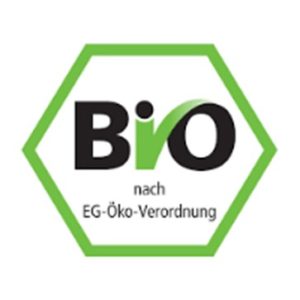
The original EU Eco regulation has been revised several times throughout the years, the newest version taking effect on January 1st, 2022. Critics in recent years have pointed out flaws in the requirements to label a good 100% bio. For example, the EU regulation only requires goods to come from 95% biological production. This means, a farm can grow “bio goods” right next to “non-bio goods” and still label them as bio.
For this reason, independent agriculture associations started creating their own “Premium Bio-Seals” with stricter criteria. To help you understand the differences, we will compare several Bio seals to the original EU-seal in the following:
What are the differences between the labels?
EU “Bio” seal:
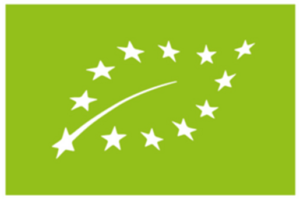
Consumers will most often see the EU seal in all types of grocery stores, since it is the most commonly used. Even though it has the lowest entry criteria for farmers, consumers can be certain that the products containing this seal are more sustainable than any products without any seal.
- A maximum of 270 laying hens, 580 chickens, or 14 pigs per hectare.
- A product made out of a minimum of 95% bio-ingredients.
- A 53 authorized additives in Bio-products.
Bioland seal:
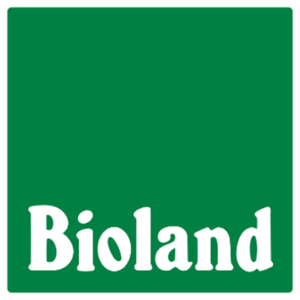
Bioland is the largest cultivation association in Germany and its seal not only is awarded to food but also to plants and animal feed. To be awarded this seal, the cultivator needs to fulfil much stricter criteria which also evaluates the entire ecological cycle.
- A maximum of 140 hens, 280 chickens, or ten pigs.
- A product made out of 100% bio-ingredients (must be certified by Bioland).
- 22 authorized additives in Bio-products.
- Consumers can find Bioland products at Edeka and Lidl supermarkets.
Naturland seal:
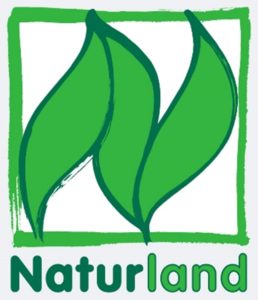
Naturland is a global association with over 65,000 producers. Being stricter than the EU seal, they also assess social guidelines, regionality, and fair trade for their certification.
- A maximum of 140 hens, 280 chickens, or ten pigs.
- A product made out of 100% bio-ingredients (must be certified by Naturland).
- 22 authorized additives in Bio-products.
- Consumers can find Naturland products at Edeka, Rewe, and DM stores.
Demeter seal:
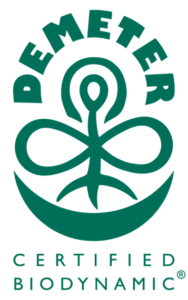
Demeter is another association which awards products fulfilling strict guidelines. Next to food, they also award cosmetic items which comply with a high degree of sustainability.
- A maximum of 140 hens, 280 chickens, or ten pigs.
- A product made out of 100% bio-ingredients (min 90% from Demeter raw ingredients).
- 21 authorized additives in Bio-products.
- Consumers can find Demeter products at Edeka, Kaufland, and DM stores.
There are far more criteria for each association that agricultural enterprises need to fulfill. Still, the general theme is clear:
- No pesticides
- More space per animal
- Fewer additives
- More restrictions on animal feed
- A higher percentage of pure bio ingredients per product
How can I detect a credible label?
Besides these official “Bio” labels, hundreds of independent labels and seals promise to produce their products sustainably and ethically. A great way to check the authenticity of these labels is the websites www.label-online.de and www.labelchecker.de.
These websites give consumers insight into the origin, the criteria, and a “trust recommendation” of the label.
A quick search is enough to determine whether the product you are considering buying is as sustainable as it claims to be. The website checks, for example, whether the creator of a label is the same person as the examiner of criteria fulfilment and even compares them in different categories such as “social contribution”, “ecologic contribution,” and “credibility”.
An alternative to these two websites is the widely available Android, Windows, and iOS App “NABU”.
With this app, users can take a picture of the label in question, and the application gives you a recommendation on whether the good is environmentally friendly.
A green thumbs-up stands for a recommendable product, a yellow thumb to the side stands for a good product with some improvement in the sustainability aspect, and a red thumb facing downwards shows goods that are not environmentally friendly.
Questions for you!
- Do you look out for “organic labels” before choosing a product?
- Would you use an app like “NABU” to check the credibility of a label?
- Does it matter to you how much space an animal has to live?
- Which organic products do you usually buy?
Sources
- Das Umweltzeichen Ihres Vertrauens: EU-Ecolabel
- Oekolandbau: Bio-Siegel
- Neue Test-Ergebnisse: Warum BIO nicht immer besser ist | EAT SMARTER
- Home | LABEL-ONLINE – Das Portal mit Informationen und Bewertungen zu Labeln in Deutschland.
- EU-Öko-Verordnung | Bund Ökologische Lebensmittelwirtschaft (boelw.de)
- Neues Bio-Recht: Was bleibt, was ist neu | Bund Ökologische Lebensmittelwirtschaft (boelw.de)
- Übersicht über die neue Öko-Basisverordnung EU 2018/848 und ergänzende Rechtsakte | Bund Ökologische Lebensmittelwirtschaft (boelw.de)
- BMEL – Ökologischer Landbau – 20 Jahre Bio-Siegel
- Bioland
- Bio-Siegel im Vergleich: Was haben die Tiere von Bio-Tierhaltung? (utopia.de)
- App „Siegel-Check“ – NABU

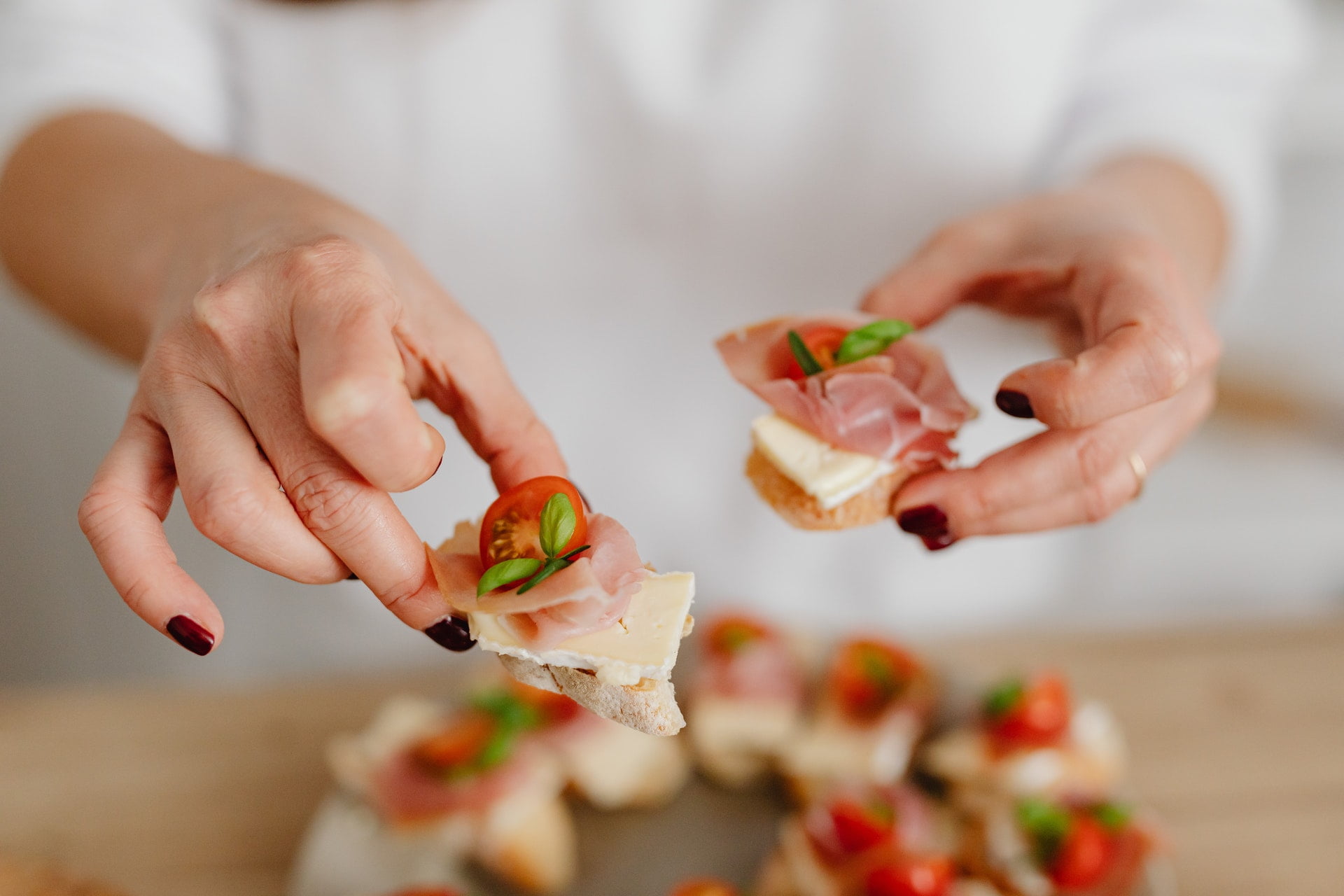



I usually buy organic lemons and ginger, but besides that I have to admit that I don’t buy many organic products intentionally.
While I do look at the labels, they often leave me quite confused.. So thanks for this overview!
You’re welcome Sara!… And we are confused too!…. Besides, there are some kind of unwritten rules that generate an not-saintly use of these labels
Don’t give up and keep it up!
I dont know about you guys, but Im so confused about all these sustainable food labels. Are they really trustworthy? 🤔
Hey guys, Im really torn on this whole sustainable food label thing. Is organic really sustainable? Can we trust any of these labels? 🤔
Comment:
Hmm, Ive always wondered if those sustainable food labels are actually trustworthy. 🤔🌱
Oh please, stop with the skepticism already! Sustainable food labels go through rigorous certification processes to ensure their credibility. If you cant trust them, then what can you trust? Its time to embrace positive change and support sustainable practices. 🌍🌱
Who needs labels? I grow my own food, cant get any more sustainable than that!
Thats great if you can grow your own food, but not everyone has the resources or space to do so. Labels help consumers make informed choices about their food and support sustainable practices on a larger scale.
Okay but seriously, can we trust those fancy sustainable food labels? I mean, whats the real difference between organic and bio? 🤔
I dont know about you guys, but Im skeptical of those sustainable food labels. Whos with me? 🤔🌿 #JustAnotherMarketingGimmick
I understand your skepticism, but sustainable food labels play a crucial role in promoting ethical practices and environmental responsibility. While some may abuse the label, many brands genuinely strive to make a positive impact. Its essential to do thorough research before making judgments. #SupportingSustainability 🌎🌱
Organic, bio, sustainable… Who really knows what they mean anymore? Labels are confusing!
I completely understand your frustration. It seems like everyone is throwing around these labels without any real understanding. Its time we demand more transparency and accountability from the companies and organizations using them. Otherwise, its all just empty words.
Comment:
Hey guys, just read this article on Can We Trust So-Called Sustainable Food Labels? and it got me thinking. Are organic labels really sustainable? Thoughts? 🌱🤔
Hey there! Its a valid point, and honestly, the sustainability of organic labels can be debated. While they do promote more environmentally friendly practices, the overall impact on long-term sustainability is still up for discussion. Its definitely a complex topic worth exploring further. 🌍🤷♀️
Is anyone else confused by all these food labels? I mean, organic is supposed to mean sustainable, right? But what about those sneaky sustainable food labels? Can we trust them? 🤔
I feel your confusion! Food labels can be a real headache. Organic and sustainable labels may sound promising, but the truth is, trust is hard to come by. Its always smart to do your own research and dig deeper. Dont let those labels deceive you! 🧐
I dont know about you guys, but Im so confused about these sustainable food labels! Are they really trustworthy? #foodconfusion
I hear you! Its a jungle out there in the world of sustainable food labels. While some may be legit, others seem more like greenwashing. Its all about doing your research and supporting trustworthy certifications. Dont let the confusion stop you from making informed choices! #stayvigilant
Who cares about labels? Just grow your own food and be done with it!